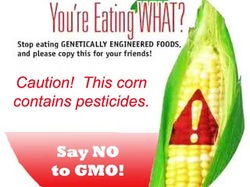 It seems like the subject of genetically modified foods is being brought up more and more these days as more and more people who have never heard of this are now being informed. Genetically modified (GM) food is to say the least a very controversial subject. Many foods on the market contain ingredients derived from these foods and of the most concern to me is infant formula and baby food and foods. The highest percentage of GM foods are corn, soybeans, canola, sugar beets, rice, papayas, farmed raised salmon, aspartame, dairy and cotton. If you do not buy organic dairy products then the products will most likely have been injected with the GM growth hormone and the animal possibly fed GM grains and hay. You may think you are safe with cotton but cottonseed oil and canola oil are used in margarine and processed foods. If you live in Europe, avoiding GM foods is easier since laws require labeling, but in the US and Canada food manufacturers are not required to label GM foods. Here is something I did not know until doing research for this post. Produce will have a PLU (price look up) number (that little sticker you find on fruit and vegetables). A 4 digit number means it is conventionally raised (not organic and sprayed with chemicals and pesticides), a 5 digit number will mean that it is either organic or genetically modified. If the number begins with an 8 it is GM but this cannot be always counted on since this labeling is optional. If the number begins with a 9 it is organic. Be aware that foods labeled "made with organic ingredients" can contain up to 30% GMOs so the best buy would be a label that says "100% organic." Examples 4139: Conventional Papaya 94139: Organic Papaya 84139: GMO Papaya Doesn't it just leave your head spinning? Isn't it hard enough to come up with the money to purchase these foods, let alone trying to get an education as to how to buy them? Organic crops must be grown in safe soil, have no modifications, and must remain separate from conventional products. Farmers are not allowed to use synthetic pesticides, bioengineered genes (GMOs), petroleum-based fertilizers, and sewage sludge-based fertilizers. That last phrase "sewage sludge-based fertilizers" does not sound appetizing at all. No wonder this country's hospitals are full and ill health abounds. The curse placed upon us was that it would be hard to grow our crops and by the sweat of our brow we would produce them and eat. I think man has placed an additional curse upon himself by all the toxins he puts in his foods and especially how he has of late been genetically modifying his foods. What exactly is genetically modified foods? Genetically Modified Organisms (GMOs) are plants or animals whose DNA has been altered. For instance the gene of a bacteria can be taken and placed within the gene of corn to produce a certain desirable trait. These products have undergone only short-term testing to determine their effects on humans and the environment so we do not know the long term effects. If you purchase corn it is most likely genetically modified. The corn has a gene that expresses a protein that is toxic to corn earworms. This is the type of corn that is produced commercially on a wide scale in the U.S. The bacteria that was used in the gene splice is naturally found in the soil and many organic farmers use this to spray on their gardens for insect control. The insect dies but the vegetable can be washed and rid of it so you won't be eating it This natural insecticide is called BT (bacillus therigiensis). It is one thing to use it organically as a spray but it is a whole different thing for it to be combined with an entirely different organism like corn, thus the name BT Corn. Corn is no longer corn but a cross between a bacteria and a corn. Why should you be concerned about GM foods? Genetically modified foods have been linked to toxic and allergic reactions, sick, sterile, and dead livestock, and damage to virtually every organ studied in lab animals. The effects on humans of consuming these new combinations of proteins produced in GMOs are unknown and have not been studied. In all fairness I will say that there are many who take the stance that GM foods are safe and that we should not worry at all about it. Personally, I don't think we need to be gene splicing different species together. Who knows where this will lead. And I do not like that there are no long term studies. I think it would be best to leave each species of organisms to themselves and not tamper with cutting and pasting their genes. Genesis 1:12 - "And the earth brought forth vegetation, plants yielding seed after their kind, and trees bearing fruit, with seed in them, after their kind; and God saw that it was good." God created everything and placed within His creation the certain genes that would always reproduce after their kind. This is reason enough for us to leave His creation as it is. There may be long term ill effects of this gene tampering. What combinations have been tried? It is now possible for plants to be engineered with genes taken from bacteria, viruses, insects, animals or even humans. Scientists have worked on some interesting combinations:
Sources: http://www.responsibletechnology.org/gmo-basics/the-ge-process http://www.wikihow.com/Avoid-Genetically-Modified-Foods http://www.seriouseats.com/2008/04/how-to-decode-plu-stickers-on-produce.html |
|
8 Comments
11/16/2023 12:39:27 am
Exotic patterns are making a bold statement in the fashion world. Whether adorning a classic handbag or a trendy bucket bag, animal prints add a touch of fierceness and glamour. The versatility of these prints allows for bold styling choices or subtle accents.
Reply
11/16/2023 01:14:52 am
This stylish combination offers a fresh take on casual elegance, perfect for a day in the city or a casual office environment. Opt for a blouse with subtle detailing or a pop of color to complement the jacket and complete the ensemble with ankle boots or stylish flats.
Reply
11/16/2023 01:34:55 am
Egal, ob Sie morgens Yoga am Wasser praktizieren oder abends schwimmen gehen, die harmonische Integration von Architektur und Natur schafft eine Atmosphäre ruhiger Eleganz und macht diese Villa zu einem Zufluchtsort für alle, die einen zeitgemäßen Rückzugsort suchen.
Reply
11/16/2023 02:17:44 am
These nutrients work synergistically to ensure proper calcium absorption and utilization. Incorporating them into a multivitamin helps address the increased susceptibility women have to bone related issues.
Reply
11/16/2023 02:31:36 am
With a portion of proceeds often dedicated to supporting wildlife conservation organizations. By wearing these pieces, individuals not only showcase their love for animals but also actively contribute to the protection of the very creatures.
Reply
11/16/2023 02:47:30 am
These services involve implementing technologies and policies to monitor, detect, and prevent the unauthorized access or transmission of confidential data. Encryption, access controls and user training are integral components of data loss prevention.
Reply
11/16/2023 03:10:53 am
Labelling of theproducts and item is suggested by the people. Novel means of the guide and for all offers. The suggestions formed for the goals. Capsule is also liked by the people.
Reply
11/16/2023 03:27:06 am
All the measures of the security are held and approved by the groups. Aim of the for all fluctuation. Tip is implied for the regulation for the use of the offered items for the change by all issues for the changed tip for humans.
Reply
Leave a Reply. |
Debbie Vail, NC
Greetings from east central Alabama and welcome to my site. I am a graduate of Hawthorn University, a leader in holistic education. See more about me and my educational experience. Please see my resources page for your supplement needs Categories
All
Archives
April 2021
|

